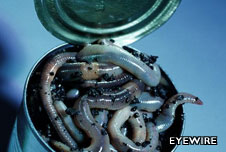| Finn: | Hello and welcome to The English We Speak. I'm Finn. |
| Feifei: | And I'm Feifei. |
| Finn: | Worms are great—don't you think they're really interesting? |
| Feifei: | Erm, yeah, kind of. But what's today's phrase? |
| Finn: | Yeah, yeah, yeah, we'll come to that in a minute. But, did you know earthworms, the kind you normally find in the soil, are both male and female in one body? |
| Feifei: | That is quite interesting. |
| Finn: | And if you cut a worm in half—only one part of the worm will die! |
| Feifei: | Oh yes, the part with the fat little bump on it will survive. I knew that. |
| Finn: | And earthworms can be really short—from only one millimetre—to a massive three metres! Oh, and, another one, worms can ... |
| Feifei: | Finn, hang on a second, why are we talking about worms so much? |
| Finn: | Sorry, yes, I was doing some research for today's programme. The phrase, today, is: a can of worms! |
| Feifei: | Right. Well 'a can of worms' is a phrase we use to describe a situation that causes a lot of problems when you start to deal with it. |
| Finn: | Yes, sometimes you want to deal with a problem, but you realise that by dealing with that problem it will open up a whole set of new problems. |
| Feifei: | Like in these examples: |
